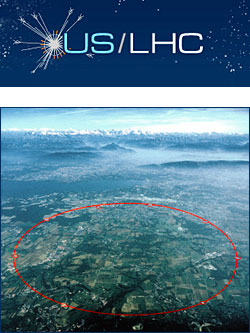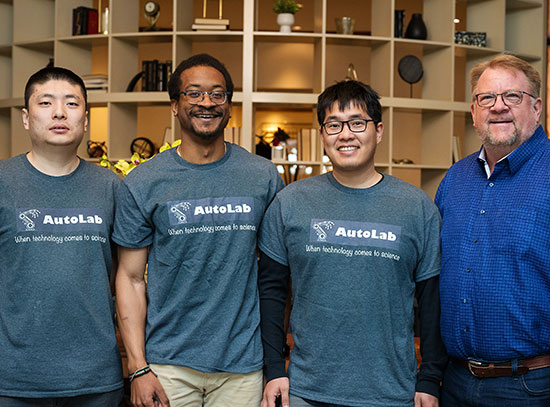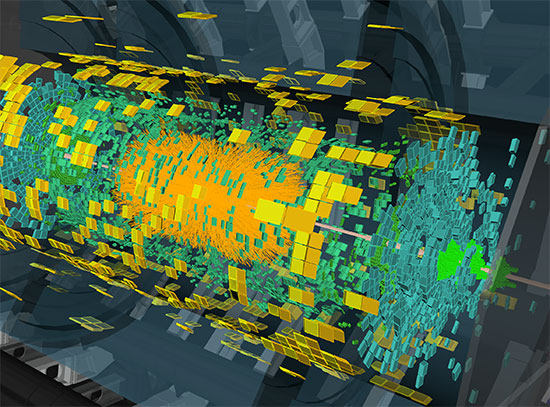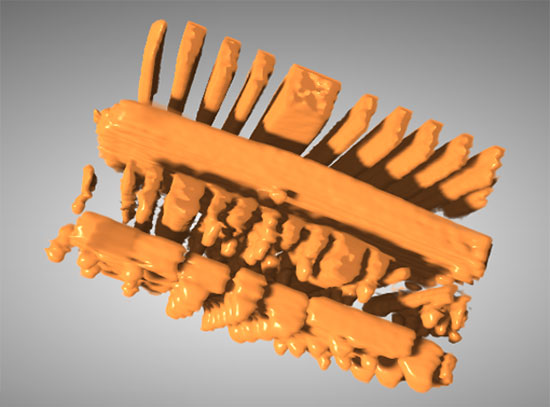DOE's Office of Science Launches Website for U.S. Role at Large Hadron Collider
September 12, 2007
The following news release distributed by the U.S. Department of Energy's Office of Science announces a new website that will describe the work of U.S. physicists, engineers, and students at the Large Hadron Collider (LHC). More than 1,200 physicists from 90 American universities and laboratories, including Brookhaven National Laboratory, collaborate in the LHC - a particle accelerator that will begin operating in Europe, near Geneva, Switzerland, next year. Brookhaven plays a key role in the project as the host for the 42 U.S. institutions contributing to ATLAS, one of two general-purpose experiments designed to cover a broad range of LHC physics. As a Tier 1 computing center, Brookhaven works with five university Tier 2 centers to provide a large portion of the overall computing resources for U.S. collaborators in ATLAS. Brookhaven also is the central hub for storing and distributing ATLAS experimental data among U.S. collaborators. For more information, or to interview a Brookhaven scientist involved in the LHC, contact Kendra Snyder at (631) 344-8191.

US/LHC logo (top) and an aerial view of the Geneva, Switzerland area with the 27-kilometer path of the LHC tunnel outlined in red.
WASHINGTON, DC - The U.S. Department of Energy's Office of Science today launched a new website to tell the story of the U.S. role in the Large Hadron Collider (LHC), a particle accelerator that will begin operating in Europe, near Geneva, Switzerland, next year. Hundreds of physicists, engineers and students from the United States are joining with colleagues from around the globe in the largest and most complex scientific experiments ever built. The LHC experiments will address some of the most fundamental mysteries of the universe.
The new website, www.uslhc.us, funded by DOE's Office of Science, aims to provide one-stop shopping for anyone seeking information about the U.S. and the LHC. Updated daily, the website features up-to-the-minute news and information about the LHC, along with high-resolution graphic images, scientists' blogs, resources for students and educators and contact information for news media.
"The LHC will become the world's highest-energy particle accelerator when it is scheduled to turn on in 2008," Dr. Robin Staffin, DOE's Associate Director of Science for High Energy Physics said. "The U.S. has played key roles in the design and construction of both the LHC experiments and the accelerator. The new website will tell the story of U.S participation in this extraordinary scientific adventure as it unfolds."
The LHC is located at CERN, the European Organization for Nuclear Research, near Geneva, Switzerland. The LHC, 27 kilometers in circumference, has been more than 15 years in the making. The machine accelerates protons to almost the speed of light and makes them collide in the center of four cathedral-sized experiments, creating conditions that existed billionths of a second after the Big Bang. Scientists will use the information from these collisions to investigate the nature of the physical universe.
"Discoveries at the LHC could revolutionize our picture of the universe," said Dr. Joseph Dehmer, Physics Division Director from the National Science Foundation, which also provides funding for LHC experiments. "These experiments may solve the mystery of dark matter and finally answer the question of what gives mass to the particles we're made of."
More than 1,300 scientists from over 90 U.S. institutions participate in the LHC and its experiments. These scientists represent universities and national laboratories from 30 states and Puerto Rico. DOE laboratories participating are: Argonne National Laboratory, Brookhaven National Laboratory, Fermi National Accelerator Laboratory, Lawrence Berkeley National Laboratory, Lawrence Livermore National Laboratory, Oak Ridge National Laboratory and Stanford Linear Accelerator Center. The U.S. scientists join more than 4,000 colleagues worldwide in their hunt to uncover the secrets of the universe. U.S. scientists have designed and built many parts of the accelerator and experiments, and are creating advanced software and computing systems to handle mountains of data that will flow from the experiments when the accelerator turns on.
2007-10687 | INT/EXT | Newsroom









